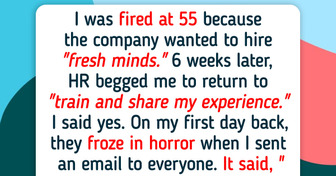I Refuse to “Show Dedication” by Working an Unpaid Weekend


The concept of “rags to riches” is often used to describe the careers and lives of famous businessmen. IKEA’s Ingvar Kamprad falls under that category himself. Growing up in a devastatingly poor little town in Sweden where everyone stood in line for food and jobs, he used his innovative brain in order to help his family earn more money. He started working from the age of 5 and by the time he was an adult he was already a successful businessman.
Bright Side is very inspired and moved by Ingvar’s life that proves how a bright mind can overcome all kinds of hurdles.
Like everyone else, his parents relied on farming to make ends meet, but the money from that was never enough. Most people around his area had to hustle for extra money, by selling homemade goods or preserved foods. His own mother opened a guest house in order to make some extra income.
From the age of 5, Ingvar started selling matches in order to help his family survive. After the first 2 years as a seller, he realized that his earnings were just pennies. This is when he found a window of opportunity, asking his aunt to buy matches in bulk from Stockholm and send them to him. He would then split the matches into smaller packages and resell them.
Basically, it was an expansion of his childhood business. At first, he only sold watches, pens, nylon stockings, and picture frames through mail order. He advertised his products in newspapers and used the local milk van to transport the orders to the closest train station.
The first furniture from IKEA was opened in 1950 as part of the company’s catalog. The local manufacturers were responsible for all the furniture, which proved to be very successful. They were so popular that Ingvar decided to stop selling everything else and focus solely on furniture.
He drove the same 1993 Volvo 240 GL for almost 2 decades and decided to get rid of it only when he was told that it wasn’t safe anymore. Myth has it that he had bought an alarm clock and disabled the “off button” so he wouldn’t keep pressing snooze. Also, he used to ride the bus pretty often and, once, he arrived at a ceremony where he was supposed to be given the “Businessman of the Year” award but he was late because he took the bus, and he was denied entry.
He always flew economy and stayed in rather dingy hotels. He preferred getting his hair cut in “developing” countries where it was very cheap and didn’t surpass his hair cut budget. In a 1998 book, he said that he would visit vegetable street markets around closing time in hopes of finding cheaper prices. As he said in 2014, “If you look at me now, I don’t think I’m wearing anything that wasn’t bought at a flea market.”
It’s also been said that his employees were taught to never throw out a piece of paper if it hadn’t been used on both sides. On one occasion, he went off on someone for throwing away the ends of a string, since the company would knot them back together.
He didn’t allow his executives to fly in business class and they were encouraged to drive modest cars. He was always looking for the cheapest price and once shouted at his wife for choosing a slightly more expensive item, which he asked for a discount on at the checkout desk. Another story goes that he would use the expensive liquor bottles in hotels and replace them with cheaper ones he would buy at the supermarket.
His real fortune was much bigger though, and he bequeathed his sons with a hugely successful company that provides jobs to hundreds of thousands of people worldwide.
Additionally, Ingvar cared so much about his home country that he made sure that after his death half of his money would be invested in stimulating northern Sweden’s businesses. He cared deeply about people in small communities who didn’t have many opportunities to succeed in life and he wanted to help them.
Do you happen to know of any success stories where people built an empire starting from nothing? Please, share your stories with us.











